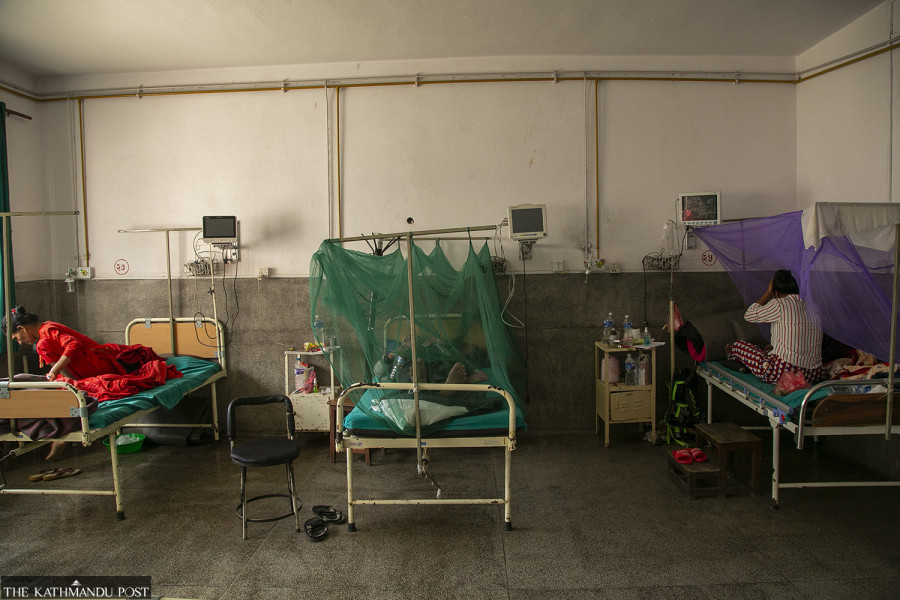Health
At least four people dead from dengue infection
Hospitals in Kathmandu Valley have been overwhelmed with dengue patients.
Arjun Poudel
At least four persons, including a pregnant lady, died of dengue, which has so far spread to 72 districts out of the 77 in the country.
According to the Epidemiology and Disease Control Division, a 38-year-old male patient died of dengue infection last Wednesday at Nepal Mediciti Hospital, Lalitpur.
Officials said that a 35-year-old woman died of dengue in Kapilvastu. Another dengue fatality has been reported from Dhading but officials said the patient had other health complications too.
“The deceased was infected with dengue but the virus is not solely responsible for the death,” said Dr Gokarna Dahal, chief of the Vector Control Section at the Epidemiology and Disease Control Division.
The Tribhuvan University Teaching Hospital said that a pregnant woman died of dengue infection last week.
Major hospitals in Kathmandu Valley have been reporting a massive surge in dengue cases of late.
The Sukraraj Tropical and Infectious Disease Hospital said that around 180 patients infected with dengue have been seeking treatment at the hospital every day.
“There are 45 dengue patients at our hospital today [Sunday],” said Dr Manisha Rawal, director at the hospital. “Six patients, whose health conditions are serious, have been receiving intensive care.”
Some hospitals have been forced to accommodate two patients in one bed.
Hospitals have been reporting dengue hemorrhagic fever and dengue shock syndrome.
Dengue hemorrhagic fever can cause internal bleeding and a sudden drop in blood pressure. Doctors say dengue shock syndrome is a dangerous complication of dengue infection and is associated with high mortality.
“Two patients came to our hospital in the shock stage,” said Rawal, the director at the Sukraraj Hospital. “They have been receiving treatment at the hospital’s intensive care unit and their condition is stable now.”
The administration at Tribhuvan University Teaching Hospital said that of the 23 beds in the hospital’s emergency ward, 19 were occupied by dengue patients on Sunday.
Six patients including a hospital worker have been admitted to the intensive care unit.
“Cases of dengue infection have risen by several fold,” said Dr Dinesh Kafle, director at the hospital.
Officials at Bir Hospital said that 85 to 100 patients infected with the dengue virus have been visiting the hospital every day.
“There are 25 dengue patients at our hospital today,” said Dr Bhupendra Basnet, director at the hospital. “The number of dengue cases has been rising at an alarming rate.”
The Epidemiology and Disease Control Division said that 5,029 people have been infected with the dengue virus so far this year. The number of infected patients could be 10 times as 90 percent of the cases are asymptomatic, officials said.
Of the total infections, over 70 percent are in 10 districts, including Lalitpur (1,832 cases), Kathmandu (888 cases), and Makwanpur (598 cases), according to officials. They say office-goers and school children have been infected in large numbers.
Dengue is transmitted by female Aedes aegypti or Aedes albopictus mosquitoes, after they bite a person.
The same vector also transmits chikungunya, yellow fever, and Zika viruses, according to the World Health Organisation.
Mosquitoes that cause dengue breed in clean water and infect people in daylight. Uncovered water tanks and discarded plastic cups and bottles could also shelter dengue-carrying mosquitoes.
According to doctors, mild to high fever, severe muscle pain, rashes, severe headache, pain in eyes and vomiting are some of the symptoms of dengue.
Abdominal pain, vomiting, bleeding from the gums and nose, vomiting blood and blood in stool, tiredness and restlessness are symptoms of severe dengue.
Severe dengue is the leading cause of serious illness and death, doctors say.
Disposing of solid waste properly, covering or emptying water storage containers, using personal household protection such as window screens, and wearing long-sleeved clothes are some measures to prevent the infection.
With the massive outbreak of dengue infection, the Health Ministry has urged all the agencies concerned to carry out awareness and dengue search and destroy drives.
Nepal has witnessed outbreaks of dengue in the pre-monsoon, monsoon, and post-monsoon seasons, although the post-monsoon period is considered a high transmission season for the virus.
As the monsoon is still continuing and the post-monsoon season yet to start, health officials say the dengue infection rate could go up in the coming days. The dengue-spreading mosquitoes survive up to 45 days and their entire generation gets infected with the virus, meaning that they can transmit the same virus.
“It is not possible to predict how long it will take to contain the spread of the infection as more cases were reported in September and October in the past,” said Dr Gokarna Dahal, chief of the Vector Control Section at the Epidemiology and Disease Control Division.
In 2019, at least six people died and over 17,000 were hospitalised with dengue fever. The outbreak, which had started in the pre-monsoon period from Dharan, spread to 68 districts.
The UN health agency says there is no specific treatment for severe dengue, but early detection and access to proper medical care can lower the fatality rate.




 9.83°C Kathmandu
9.83°C Kathmandu















